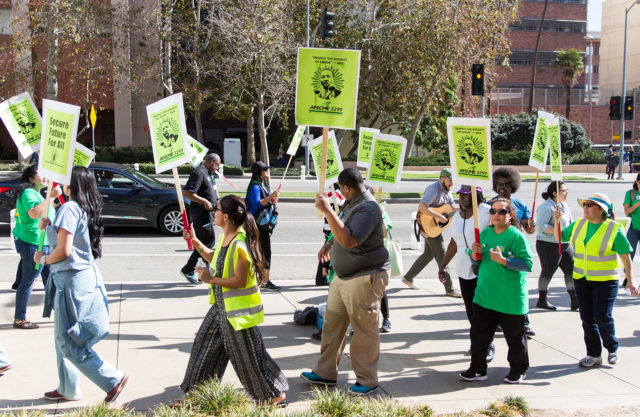When it comes to addressing budgetary losses, curtailments and furloughs should be a last resort.
But at the moment, the University of California is far too comfortable with the idea of resorting to that.
The UC Office of the President proposed a curtailment plan in October that would require employees to take five days of unpaid leave to help offset pandemic-related budget losses.
The proposal also divided workers into several tiers based on their wages, where those with the lowest incomes would be compensated for their curtailed days, while those with the highest salaries would not be compensated whatsoever.
A coalition of unions opposed the proposal and wrote a letter to the UC Regents explaining their various objections to it. Thanks to these efforts, the UC will not move forward with its curtailment plan, said Mia McIver, the president of University Council-American Federation of Teachers.
The UC must prioritize the job security of its employees, especially during the COVID-19 pandemic. Curtailment proposals should not be considered solutions, since they only force workers to advocate for themselves while simultaneously juggling the various other stresses of the pandemic.
And as we all know, everyone already has far too much to worry about.
After the UC announced its curtailment plan, a coalition of unions – which included the Council of UC Faculty Associations, American Federation of State, County and Municipal Employees Local 3299 and more – worked to express the multitude of adverse effects it would have on not only the workers but the university as a whole. The objections, which were stated in the letter, questioned the effectiveness of curtailment and its effects on already struggling workers.
Additionally, the plan seems to affect minorities the most.
The curtailment policy would have exacerbated the impacts of the pandemic on those who have already been the most affected, particularly women, low-wage workers and people of color, said Neal Sweeney, president of United Auto Workers Local 5810, the Union of Postdocs and Academic Researchers, in an emailed statement.
It is the University’s responsibility to support these individuals since they are the ones who have already been most affected by the pandemic. To show it truly stands with its workers, the UC first must stop targeting them.
Cutting wages only amplifies workers’ financial insecurity, which can prevent them from meaningfully contributing to the UC community.
Lecturers who are under the constant threat of curtailment are the very same staff members who are supporting UC undergraduates, McIver said. Asking workers to shoulder the financial consequences of the pandemic is inefficient since it only hurts the quality of education students receive.
McIver said it seems clear that students are not being put first when the UC proposes these cuts. Focusing on supporting dedicated teaching specialists should be the UC’s priority, she added.
The curtailment policy may not have passed this fiscal year, but it does not mean that workers’ wages are completely safe. After all, there is no guarantee that employees will not face the same risk in the 2021-2022 academic year.
“I do expect a fair amount of pressure for curtailments or budget cuts or job cuts to be coming,” McIver said.
Having to live in constant uncertainty doesn’t help to alleviate lecturers’ worries during an already stressful time.
And for lecturers, the fight for job security has been a long one.
UC-AFT has been negotiating for lecturer and librarian employment rights for years. Low wages, the lack of office space and financial insecurity make the looming cloud of curtailment even more stressful.
More worryingly, not all workers are free from the threat of curtailment in the 2020-2021 fiscal year.
According to an emailed statement from UCOP spokesperson Stett Holbrook, individual UC campuses have the jurisdiction to implement a curtailment if they see fit. This was done with the intention of saving jobs and preventing pandemic-related layoffs, Holbrook added.
The UC is the state’s third-largest employer and is committed to protecting and supporting its employees during such difficult times, Holbrook said. The UC understands the anxiety when it comes to economic uncertainty, especially since the California unemployment rate is around 9% and many businesses are deciding to shut down, Holbrook added.
The UC claims it supports its workers, but its actions say otherwise. As the UC Union Coalition stated in its letter, a curtailment is essentially a pay cut.
The curtailment plan also wouldn’t have saved the UC much money, which is why it decided to drop the plan and find budgeting from other sources, McIver said.
There is no doubt that the UC is grappling with an immense budgetary deficit and that losses must be recovered. However, it should always be the UC’s priority to protect its employees. The need to protect worker’s rights surpasses the need to alleviate budgetary stresses.
Instead of constantly turning to jobs to aid their budget deficits, the UC must actively search for alternatives that will not negatively impact workers.
Ensuring a quality education for all UC students means protecting the jobs of UC employees – something the higher-ups at the UC must remember.

